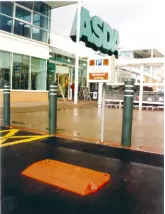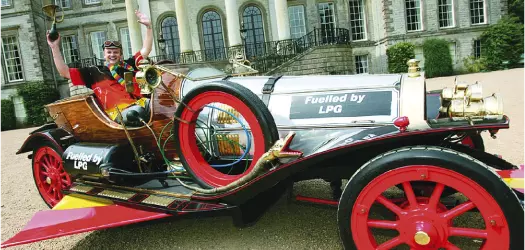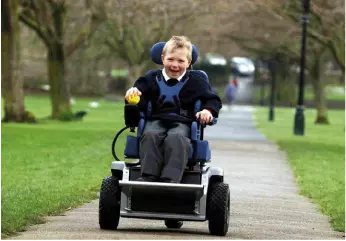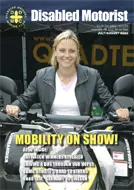
Asda wins Baywatch 'best chain'
An Asda store with the Spacehog
disabled parking system installed.
SUPERMARKET chain Asda won the top award at the 2004 Baywatch disability parking awards.
The awards event, held in London on July 14 and supported by RAC, was the culmination of a competition which saw more than 2,000 stores owned by Asda, Safeway, Sainsbury's and Tesco take part.
More than 5,000 competition forms from disabled customers around the UK were received by Baywatch, nominating the best – and worst – when it comes to parking for disabled people. The categories included:
• Best large store, won by Asda Bishop Auckland
• Best small store, won by Tesco Metro Withernsea
• Best employee, won by Len Lewis of Asda Falmouth
Fifteen stores and employees which made it to the final were assessed by an independent adjudicator before judging in June.
Ed Passant, Chief Executive of the Disabled Drivers' Motor Club and one of the judges for the awards, said: "The judges were unanimous. Asda have shown a real commitment to improving parking for disabled people and many of its stores achieve an excellent standard."
Douglas Campbell, of the Disabled Drivers' Association congratulated Asda on its win, and added: "The most recent Baywatch survey showed that many disabled people were unable to park in a designated space when they go shopping, with more than one in five bays being abused by people without valid disabled badges. We hope all retailers will try and follow Asda's example to help ensure disabled people can shop where – and when – they want to."
Representatives from across the supermarket chains including Asda, Safeway,Sainsbury's and Tesco attended the awards event. Other guests included Minister for Transport Tony McNulty MP, who presented the award for best supermarket chain.
Peter Smith, chairman of RAC, which supported the 2004 Baywatch awards, said: "RAC has taken a keen interest in the work of Baywatch. We're delighted to support the awards and take this opportunity to applaud the winners." Mary Wilkinson, editor of Disability Now, added: "The nominations from disabled people show that there is some very good practice out there. We hope other retailers will join Baywatch for the 2005 competition, and help us spread the message that there is no excuse for parking abuse."
The finalists (placings in brackets) in each category were:
Best large store – Asda Bishop Auckland (winner), Asda Falmouth (second place), Asda Coventry (third place), Asda Lincoln, Sainsbury's Thanet, Tesco Merthyr Tydfil, Tesco Ware.
Best small store – Tesco Withernsea (winner), Tesco Ledbury (second place).
Best employee – Len Lewis (Asda Falmouth) (winner), Anne Fowler (Asda Radcliffe) (joint second place), Colin Williams (Asda Wolverhampton) (joint second place), Hullas Mehta (Tesco Hertford) (highly commended), John Franklin (Asda Coventry), Les Mutlow (Asda Swindon).
Finalists were chosen through a weighted system, taking into account the different sizes of the chains and the number of nominations received for worst store.
The Baywatch campaign was formed by the British Polio Fellowship, the Disabled Drivers' Motor Club, the Disabled Drivers' Association, and the newspaper Disability Now.
DDMC links up with Keep Able to raise funds
DDMC has teamed up with Keep Able to provide access to daily living aids and disability equipment through their website.
The Keep Able website was launched at last year's Mobility Roadshow and has proved to be popular with customers.
Now visitors to the DDMC website can click through to the equipment shop, which provides a secure environment to buy a broad range of products, from kitchen gadgets to large items like bath-lifts and
wheelchairs.
All purchases made through the jointly branded shop help to raise funds for DDMC.
Ed Passant, DDMC Chief Executive, said: "We think this is a great idea and provides a valuable service to our members and visitors to our website.
"Keep Able is a well-respected and trusted supplier in the industry, which was very important to us in entering into the partnership."
Dave Foote, of Keep Able, added: "This type of partnership not only extends access, but can provide a valuable revenue stream for DDMC."
Visit www.ddmc.org.uk or www.disabled- motorist.co.uk to click through to the online shop.
Green bus parking row
IT'S NOT often the DDMC receives an “unreserved apology” from a political party but, following a complaint from one of our members, we managed to do just that – and then found all was not quite as it first appeared.
Michael Gough contacted us after seeing a BBC2 Newsnight piece, with a Green Party worker questioned over his use of a disabled parking bay in Gloucester for the “Election Battle Bus".
The reply came back along the lines of, "No one was parked there and no one wanted to park there", says Michael, who was understandably outraged.
Disabled Motorist contacted the Green Party press office and a statement from disability spokesman Dr Joseph Healy said: “The Green Party apologises unreservedly for the incident. We are fully aware that non-disabled people using parking spaces reserved for disabled people is a big issue. We would never advocate someone parking in such a space even temporarily.
“However, the Green Party is the party with the best policies for disabled people. We have been campaigning for progress on disability rights on a number of issues, including transport.
"We are pushing for a fully accessible transport system by 2020. Many disabled people currently have no choice in the form of transport they take because they cannot use public transport."
This clear-cut acceptance that, whatever happens, you don't park in
a disabled bay was to blur as a Green Party worker who was on the Battle Bus pointed out they had been directed to park there. Rebbeca Yeo told Disabled Motorist: "The bus parked . . . in an area designated by the council and reserved by the police with a row of cones.
“The fact that the city council and Gloucestershire police designated this parking area may indicate the importance they give to disabled people's right to park.
"This low priority is not endorsed by the Green Party, which wholeheartedly apologises if any inconvenience was caused by using this bay and in no way condones non-disabled people parking in
designated disabled parking spaces."
On checking with Gloucester City Council, however, Disabled Motorist
was told the Green Party had declined the council's offer of a site to park the bus and had instead used a site identified by police in Brunswick Road "in a bay that is used for loading and unloading as well as disabled motorists".
The police told Disabled Motorist:
"We can confirm Gloucestershire Constabulary did authorise the Green Party campaigning bus to park in a disabled parking space. As the space is not a dedicated disabled parking space – it is also a loading and unloading bay – we considered the safety of all road users and the logisitics of traffic management and therefore permission was granted to accommodate the political tour.
"There are adequate disabled parking spaces available around the city of Gloucester and traffic wardens frequently patrol Brunswick Road. They would have been able to assist a disabled motorist and we can confirm that we have received no complaints at this time."
Baffled by the notion of a joint loading/ disabled bay, Disabled Motorist
asked DDMC Gloucester Representative Keith Sansome to take a look and, on a Tuesday afternoon, he found four cars parked in the bay, all with the correct badges, and the bay clearly marked with the standard signage for a disabled parking bay. What he couldn't see, however,
was any indication that the bay could also be used for loading.
As this magazine went to press, we were still looking for an answer to what happens when a lorry arrives at the same time as a disabled motorist.
Barrier-free method to boost access to E-recruitment
E-RECRUITMENT – job recruitment on-line – is growing fast, with more than a third of job seekers looking for work via the web in 2002 alone, according to the Employers' Forum on Disability. But this job application process excludes more than 1.3m disabled people in the UK, simply because websites are inaccessible and badly designed, it says.
On its Barrier-free Recruitment website the Forum has created web pages for a fictional company to show what a fully accessible website should look like. The Forum has also produced a separate hard-copy guide for employers (pictured left) to help them improve their on-line recruitment of disabled people. http://www.barrierfree-recruitment.com 
Quality the key in show season
MOBILITY show organisers have been emphasising quality over quantity at their events this summer.
As the numbers of visitors attending the Mobility Roadshow at Donington Park slipped back after last year's record figures, organiser Mobility Choice was keen to point out that exhibitors had been delighted by the sort of visitors the show attracted.
At the Mobility South show, held by Gowrings Mobility at Newbury racecourse, the ability to move around free of crowds was extolled as a benefit.
The Donington Park event, the biggest mobility show on the calendar, which was celebrating its 21st anniversary, is thought to have attracted around 20 per cent fewer visitors than last year when around 20,000 people were reported to have passed through the gates.
Mobility Choice said competition from the European football championships and poor weather contributed to fall in visitors. In fact, the weather was so poor that the volunteers who had been counting visitors were needed to help in the car parks instead.
But organisers were delighted by the record number of new products and exhibitors at the event.
“It was extremely encouraging to see so many exciting new products and the
increasing investment by manufacturers in inclusive design,” said Jacqui Jones, Mobility Choice director of projects and events.
A director of Dutch vehicle manufacturer Freewiel, Sander van Dooren, said: “I do a lot of shows across Europe, but this show is really special because it focuses on 'move ability'. The quality of visitors was really high.”
Among the guests of honour at Donington Park this year were DDMC Patron the Earl of Snowdon and TV motoring presenter Vicki Butler Henderson.
Another reason why numbers may have been down at Donington Park was the introduction of a Scottish Mobility Roadshow, held two weeks later in early July.With the Princess Royal as guest of honour, the two day event near Edinburgh is reported to have attracted more than 3,000 visitors – many of whom might normally have travelled down to the Midlands. It was also a chance for familiar exhibitors such as Cyclone and Brotherwood to set out their stall north of the Border.
The increasingly crowded mobility show season kicked off with Mobility South on June 4-5, which is reported to have attracted just under 2,000 visitors.
Gowrings have already confirmed they will hold the event again next year.
It is still to be decided if there will be another Mobility Roadshow in Scotland next year. 
Inclusive fitness in spotlight at top leisure exhibition
THE INCLUSIVE Fitness Initiative has been working closely with the organisers of Leisure Industry Week 2004 to deliver an Inclusive Fitness Arena at this year's show. The show takes place at the Birmingham NEC September 21-23 and features all that's new in the leisure and fitness market place.
A partnership is developing with the IFI official suppliers with a view to displaying a range of IFI accredited fitness equipment to potential IFI Sites or organisations simply wanting to make their gym environment more inclusive. The stand will also operate a consultancy lounge area where delegates can get advice on making leisure facilities and operations more inclusive, not only making facilities more physically accessible but also addressing issues of culture and attitude. With the next phase of the Disability Discrimination Act only seven days away at the time of the exhibition this advice could not be more timely.
Blair strategy report confirms failure
A REPORT from the Prime Minister's own strategy unit has confirmed the extent to which disabled people are disadvantaged in terms of income, education, employment and other opportunities in life.
Children are almost twice as likely to experience poverty if there is a disabled adult in the family, the report says.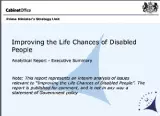
Disabled people are generally more likely to be in lower income groups, and also more likely to have no educational qualifications.
The Government itself comes under fire in the report. Although there are many successful services and policies in place to tackle disadvantages faced by disabled people, these can be “fragmented” and in some cases, may have little effect, it says. In fact, the report suggests that general policy-making has “failed to incorporate the voice, needs, interests and aspirations of disabled people”.
The report is the latest phase of a project launched by the strategy unit at the end of 2003 intended to identify and tackle the barriers faced by disabled people and to improve their opportunities in life. The strategy unit will use the report as the basis for a final set of policy recommendations to the government in the autumn.
Councils bury heads in sand
THREE IN ten local authorities do not know how many of their services, such as council offices and libraries, will be accessible for disabled people when the Disability Discrimination Act goes live in October this year, says the Disability Rights Commission.
Although all of the 60 or so local authorities that responded to a DRC questionnaire said they were aware of the new duties required by the DDA, this was not always reflected in their policies.
Nearly a third of those who responded did not have a lead councillor on disability, and four in ten said they did not plan to draw up a strategy to deal with disability-related issues.
Making hospital a little easier
NHS staff are to be given a new leaflet explaining how they can improve services for disabled people through a series of simple measures, designed to make hospital visits a little easier.
Staff should also offer people the chance to give feedback on the services that they provide to ensure that they are meeting the requirements of disabled people.
The leaflet is part of a Government action plan to ensure that health and social service providers are meeting the requirements of the 1995 DDA.
Gowrings
GOWRINGS Mobility MD Linda Ling (centre) launches a partnership with Leonard Cheshire at the Gowrings Mobility South event with Francois Gallais, regional fundraising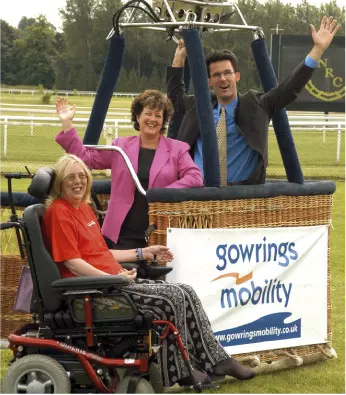 manager of Leonard Cheshire, and Denise Fuller, of Hydon Hill Cheshire Home in Godalming, Surrey.
manager of Leonard Cheshire, and Denise Fuller, of Hydon Hill Cheshire Home in Godalming, Surrey.
Under the deal, for every Gowrings Mobility product sold that is generated by Leonard Cheshire, Gowrings will donate at least one per cent of the value to the charity. To kick-start the year-long collaboration, Gowrings organised a raffle at Mobility South in June to win a flight in its wheelchair accessible hot air balloon and over the two days £712.50 was raised for Hydon Hill Cheshire Home.
CHITTY CHITTY Bang Bang
CHITTY CHITTY Bang Bang flies in to help to turn motorists on to the benefits of conversion to LPG. Cars and vans converted to run on LPG as well as petrol can reduce fuel costs by up to 40 per cent and can reduce harmful particulates by 75 per cent, compared with an equivalent diesel vehicle. Yet only 100,000 drivers in the UK have made the switch .
Chitty Chitty Bang Bang was converted several years ago, so it didn't puff out dirty fumes, but also because the LPG it uses is half the price of petrol and diesel.
Derek Northcott, boss of EcoGas Systems and spokesperson for the Boost LPG campaign, blamed low awareness for the low numbers of drivers. “The industry has been converting vehicles for more than 25 years, so it is certainly tried and tested technology.
The number of approved installers and refuelling sites have increased so there is every reason to switch to LPG,” said Derek, seen above in Chitty Chitty Bang Bang's driving seat.
The Boost LPG campaign, funded by the Department of Trade and Industry, aims to increase the number of LPG drivers and installers. For more information visit www.boostlpg.com or phone 0800 032 5533.
Car-pool lanes scheme to 'bust' M-way congestion
A PILOT scheme to cut congestion and improve journey times on motorways by creating dedicated lanes which will be reserved for vehicles carrying two or more people has been announced by Alistair Darling, Secretary of State for Transport.
motorways by creating dedicated lanes which will be reserved for vehicles carrying two or more people has been announced by Alistair Darling, Secretary of State for Transport.
High occupancy vehicle (HOV) or carpool lanes aim to encourage drivers to share cars – but it is not yet known if there will be concessions for disabled motorists unable to carry passengers.
The lanes are expected to be created by using the hard-shoulder as a running lane or by widening the road to create an additional lane and they would be reserved for the use of cars, offering a faster more reliable journey.
The sites for the Highways Agency to look at are M62 Junction 25 to 27, M3 Junction 3 to 2, M1 Junction 13 to 7 and M61 Junctions 6 to 3. In general the Government favours providing extra capacity for car pool lanes, but it may be possible to use one of the existing lanes. HOV lanes are already in use in Leeds, and in other countries including Australia and the United States.
Alistair Darling said: “The Government is determined to tackle congestion
on Britain's roads. Carpool lanes help drivers carrying several people by providing dedicated lanes. This makes best use of scarce capacity on our roads.
“Carpool lanes are part of the Government's commitment to provide better service to road users. I hope that drivers will be encouraged to consider car pooling to take advantage of the new lanes.
"It works elsewhere. There is no reason why it can't work here as well.”
DRC sets out its ten-year vision
THE DISABILITY Rights Commission has set out a ten-year “vision” for the changes that it wants to see occur for disabled people in work, education, health and other areas, between now and 2014.
Within ten years, 60 per cent of disabled people of working age should be
employed, compared with 49 per cent now, it says. For other areas, such as transport and health and earning potential, the DRC has not yet set targets, calling instead for a “narrowing” of the differences between disabled people and the national average. Although the DRC says it will include the needs of disabled motorists in its work, it is focusing its efforts relating to transport on the public transport network and on tackling the barriers that this currently presents to disabled users.
This is the second strategic plan the DRC has produced since it was created in 2000.
Amputees revving up for big bike day
THE LIMBLESS Association is holding its inaugural Amputee Motorcycle Track and Information Day at Donington Park on September 20.
The event, which is open to everyone and not just amputees, will feature Honda Racing's team riders, Michael Rutter and Karl Harris, fellow amputee Simon Buckmaster and the team's race bikes.
The circuit's Paddock Suite conference hall will feature stands from relevant companies, forums providing guidance and advice from experienced amputees, plus special guests.
Out on the track, in addition to nomal track day activities, Honda has agreed to supply Pan European bikes for 'Amputee Pillion Laps' – said to be a "unique exhilarating experience". The bikes will be piloted by international road racers.
Admission to the event is £5, with proceeds going to Limbless Association events and activities.
Further information from Scott Richardson on 020 8788 1777 ext 21 or see www.disabledmotorsport.co.uk
Call centre staff reach disability award final
SPECIALIST CALL centre staff at National Express say they are thrilled to be through to the finals of the Focus on Disability category of the National Customer Service Awards 2004.
Sponsored by The Disability Rights Commision, the category also sees the Department of Agricultural & Rural Development, the Priority Services Team at EDF Energy, and the Customer Zone at Johnson & Johnson Medical in the final short-list.
National Express has a dedicated team of telephone advisors who provide
information, support and ticket booking facilities specifically for passengers with disabilities.
In addition, work has been carried out at coach stations to ensure clear signage and easy physical access and is already providing wheelchair accessible coaches from Bath, Chippenham and Swindon to London and Heathrow ahead of time.
Final judging was taking place as Disabled Motorist went to press.
Hip device claims to ease wheelchair life
A NEW device that takes much of the effort out of stretching from or propelling a wheelchair is set to revolutionise the lives of many wheelchair users throughout the UK, according to its makers.
The Bodypoint Hip Grip is billed as a "dynamic pelvic stabilisation device" that helps the wheelchair user to maintain stability, while allowing the pelvis to move freely. The Hip Grip has taken over five years to develop in the United States and is the result of a 36-month, 23-user clinical trial.
The company says that unlike other pelvic support devices, which tend to fix the pelvis in a static non-functional position, the Hip Grip allows a person to move their pelvis forward in the wheelchair and then pulls the pelvis back into a neutral posture without the user having to work hard constantly to maintain their position.
This improves sitting posture and enhances activities such as reaching and propelling the chair, making it a powerful performance aid for many disabled people, including wheelchair athletes.
President of Bodypoint Hip Grip Dave Hintzman commented: 'There is no doubt the Hip Grip has had a significant impact on the lives of people who've tried the device.
"One person told us she used to spend half an hour on average cleaning out her cat boxes before she went to work.
After she was fitted with the Hip Grip, she carried out the same task in just ten minutes."
Demonstrations of the Hip Grip have been taking place at hospitals, wheelchair clinics and rehabilitation centres throughout the UK. It appears to be most useful for those people with specific disabilities such as spinal cord injuries, multiple sclerosis, muscular dystrophy and cerebral palsy.
Isobel Glentworth from London has MS. The 45-year-old journalist is one of many people throughout the UK who are trying out the new Hip Grip and reports:
"I started to notice the benefits of the device almost as soon as it was fitted.
"Before I received it, moving about in my wheelchair was so exhausting I needed to sleep during the afternoon to recover my strength. Now I'm not so tired in the afternoon. I can even use a knife and fork and eat properly at a table, when previously I couldn't."
The Bodypoint Hip Grip is distributed in the UK by BES Rehab, of Sawston,
Cambridge. It costs £450 plus VAT. The special hip belt costs £50 (the price will depend on the type of hip belt ordered).
For more information, call BES Rehab on 0845 1300
Road accident deaths on the rise
DEATHS among car users rose to 1,769 in 2003 – one per cent up on the previous year, according to new figures from the Department for Transport. And while the number seriously injured fell by nine per cent, the figure was still more than 15,500.
Despite the number of people killed in road accidents increasing by two per cent in 2003, the UK still has one of the best records on road safety, the Government says. The overall number of car user casualties, which includes fatalities, slight and serious injuries, was down five per cent to 188,342. The DfT also pointed out that the amount of car traffic rose one per cent – creating the potential for more accidents.
In 2001, the Government set a target to reduce the number of people killed or seriously injured on the country's roads by 40 per cent before 2010, compared with the 1994-98 average. So far it has achieved a reduction of 17 per cent.
The use of safety cameras has helped cut deaths and serious injuries by more than a third on roads where they are used to target motorists speeding or jumping red lights, the Government also claimed in a recent report. Around ten people die, and a further 70 are seriously injured every day because of excessive or inappropriate speed, it says.
Higher priority urged for stroke treatment
STROKE SHOULD receive higher priority and faster treatment, according to new clinical guidelines People who have strokes should be identified and treated more quickly for better recovery, said The Stroke Association, backing updated clinical guidelines on stroke care published by this week.
The guidelines, from the Royal College of Physicians, provide health professionals with recommendations on the best practice for stroke care, and were developed by a multidisciplinary group on the basis of clinical evidence and in consultation with stroke patients and their carers.
They suggest faster diagnosis and treatment of “mini” and full strokes.
More aggressive treatment strategies to prevent further strokes are also recommended, including controlling blood pressure and cholesterol levels, both risk factors for the condition.
For the first time, the guidelines discuss the treatment of Transient Ischaemic Attacks (TIAs) or “mini” strokes. The symptoms of TIAs last for less than 24 hours and are very similar to stroke. However, 20 per cent of TIA patients go on to have a full stroke within a month. This makes the prompt recognition of TIAs and appropriate
treatment vital.
The Royal College recommends patients with a suspected TIA should be seen at a specialist clinic within seven days and receive preventative stroke treatment immediately.
Cyberbug
Luke Kay, of Harrogate, North Yorkshire, enjoys the freedom of the park in a Cyberbug powered chair/ scooter, which can now use an expanded range of seating options.
Harrogate-based 1st By Design says the introduction of a new “interface plate” allows the Cyberbug to accommodate seats that meet a wide range of special requirements, for example, where a child has limited upper body strength, or needs additional support to prevent hip rotation.
It says the modern seating designs available, which can be supplied in a choice of colours and padded finishes, will ensure the child achieves correct positioning at all times.
Features of the seating can include fully adjustable harnesses, knee blocks, headrest, back and foot supports, and expandable seats for a high degree of comfort and to meet changes in the child's growth and postural needs. 1st By Design can also replace the complete seat with a larger specialist seating system when the child is fully grown.
Commenting on the buggy and the specialist seating options now available, parent Julie Marriott said: “We think the Cyberbug is brilliant. The new seating gives my son the support he needs and is also comfortable so he can use the buggy for longer periods.
“It is enabling us to spend much more time outside and get back to doing some of the things we were struggling with. When he was small, it was easier to lift him and push him around, but now he's older that's much more difficult.”
The Cyberbug also features a Carer's Remote Safety System, which means an adult can always take over control of the vehicle if necessary.
For further information about the Cyberbug, call 01423 543000 or see
www.1stbydesign.co.uk.
© Disabled Drivers' Motor Club all right reserved

 Disabled Motorist
Disabled Motorist